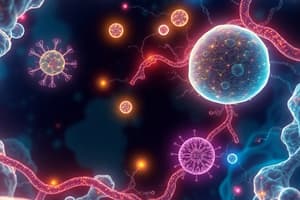Podcast
Questions and Answers
What is the primary source of energy for muscular activity in muscles?
What is the primary source of energy for muscular activity in muscles?
- Glycogen
- Glucose-6-phosphate (correct)
- Glucose-1-phosphate
- UDP-glucose
What is the enzyme responsible for adding glucose units to a glycogen primer molecule?
What is the enzyme responsible for adding glucose units to a glycogen primer molecule?
- Hexokinase
- UDP-glucose pyrophosphorylase
- Glycogen synthase (correct)
- Phosphoglucomutase
What type of linkage is formed when glucose units are added to a glycogen primer molecule?
What type of linkage is formed when glucose units are added to a glycogen primer molecule?
- Alpha-1,4 glycosidic linkage (correct)
- Beta-1,6 glycosidic linkage
- Alpha-1,6 glycosidic linkage
- Beta-1,4 glycosidic linkage
Where is lactate converted to glucose via the gluconeogenic pathway?
Where is lactate converted to glucose via the gluconeogenic pathway?
What is the purpose of the branching enzyme in glycogen synthesis?
What is the purpose of the branching enzyme in glycogen synthesis?
What is the purpose of glycogenolysis?
What is the purpose of glycogenolysis?
What is the reactant in the first step of glycogen synthesis?
What is the reactant in the first step of glycogen synthesis?
What is the byproduct of the reaction catalyzed by UDP-glucose pyrophosphorylase?
What is the byproduct of the reaction catalyzed by UDP-glucose pyrophosphorylase?
What is the byproduct of anaerobic oxidation of bloodborne glucose in skeletal muscles?
What is the byproduct of anaerobic oxidation of bloodborne glucose in skeletal muscles?
What is the role of the Cori cycle in lactic acidosis?
What is the role of the Cori cycle in lactic acidosis?
What is the enzyme responsible for dephosphorylating glucose-6-phosphate to free glucose in the liver?
What is the enzyme responsible for dephosphorylating glucose-6-phosphate to free glucose in the liver?
What is the product of phosphorolysis of glycogen in the presence of glycogen phosphorylase?
What is the product of phosphorolysis of glycogen in the presence of glycogen phosphorylase?
What is the purpose of the enzyme glucosyl transferase in glycogenolysis?
What is the purpose of the enzyme glucosyl transferase in glycogenolysis?
What is the destination of lactate produced in skeletal muscles?
What is the destination of lactate produced in skeletal muscles?
Flashcards
Glucose-6-phosphate
Glucose-6-phosphate
The primary energy source for muscular activity within muscles.
Glycogen synthase
Glycogen synthase
The enzyme responsible for adding glucose units to a glycogen primer molecule.
Alpha-1,4 glycosidic linkage
Alpha-1,4 glycosidic linkage
The type of bond formed when glucose units are added to a glycogen primer molecule.
Liver
Liver
Signup and view all the flashcards
Branching enzyme
Branching enzyme
Signup and view all the flashcards
Glycogenolysis
Glycogenolysis
Signup and view all the flashcards
Glucose-1-phosphate
Glucose-1-phosphate
Signup and view all the flashcards
UDP
UDP
Signup and view all the flashcards
Lactate
Lactate
Signup and view all the flashcards
Role of the Cori cycle in lactic acidosis
Role of the Cori cycle in lactic acidosis
Signup and view all the flashcards
Glucose-6-phosphatase
Glucose-6-phosphatase
Signup and view all the flashcards
Glucose-1-phosphate
Glucose-1-phosphate
Signup and view all the flashcards
Purpose of glucosyl transferase
Purpose of glucosyl transferase
Signup and view all the flashcards
Destination of lactate produced in skeletal muscles?
Destination of lactate produced in skeletal muscles?
Signup and view all the flashcards
Study Notes
Cori Cycle (Lactic Acid Cycle)
- Lactate is produced in strongly contracting skeletal muscles during anaerobic oxidation of bloodborne glucose.
- The produced lactate cannot be further metabolized in skeletal muscles and diffuses out of the muscles, entering blood circulation.
- Lactate is carried to the liver, where it is converted to glucose via the gluconeogenic pathway and released back into blood circulation.
- The reformed glucose becomes available for utilization in skeletal muscles.
Glycogenolysis
- Glycogenolysis is the breakdown of glycogen stored in liver and muscles.
- It maintains blood glucose levels between meals and provides energy for muscular activities.
Steps of Glycogenolysis
- Step 1: Glycogen undergoes phosphorolysis to yield glucose-1-phosphate and limit dextrin in the presence of enzyme glycogen phosphorylase.
- Step 2: The branches of limit dextrins are removed with the help of enzyme glucosyl transferase.
- Step 3: The branching point with a single glucose residue is cleaved by debranching enzyme, releasing the free glucose residue.
- Steps 4 and 5: Glucose-1-phosphate is converted to glucose-6-phosphate in the presence of enzyme phosphoglucomutase.
Fate of Glucose-6-Phosphate
- In liver: Glucose-6-phosphate is dephosphorylated to free glucose, which diffuses out of hepatic cells and enters blood circulation.
- In muscles: Glucose-6-phosphate is utilized in glycolysis as a source of energy for muscular activities.
Glycogenesis
- Glycogen synthesis occurs by a pathway distinctly different from the reversal of glycogen breakdown.
- Steps of glycogenesis:
- Activation of glucose: UDP-glucose is formed from glucose-1-phosphate and UTP by the catalytic activity of UDP-glucose pyrophosphorylase.
- Glycogen synthesis: Activated glucose units are sequentially added by the enzyme glycogen synthase.
- Branching enzyme: Creates alpha-1,6 linkages, making the molecule more globular.
Studying That Suits You
Use AI to generate personalized quizzes and flashcards to suit your learning preferences.




